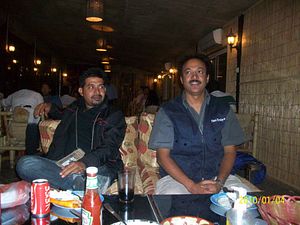It wasn’t just an eatery; it was an entrance into what Kabul once was and what it wanted to be again. It was located in the heart of the city, and in the heart and hopes of each and every citizen of and visitor to Kabul. Taverna du Liban was not a restaurant; it was a symbol of hope, an idea, an aspiration. It was a promising symbol of the new Afghanistan that started taking shape after the exit of the Taliban government in 2001.
But with the attack on the popular Lebanese restaurant on the evening of January 17, that promise took a severe beating. Terrorist attacks are, unfortunately, not new in Afghanistan, but the evening attack on the popular eatery foreshadows a very disturbing time ahead for the war-torn country. A majority of the 21 killed were foreign civilians working in Kabul or visitors to the city. This is the first attack in more than a decade on civilian expatriates and thereby threatens the future presence of outsiders in the country. Among the victims were some Afghans who were also regulars at the restaurant.
The Taliban’s main targets usually are foreign convoys, security personnel, embassies, and other government establishments. Civilians are not generally attacked. The change in strategy demonstrates new thinking on the part of the terrorist group. Over the last few years, a majority of NGOs and foreign workers have left the country and with the recent onslaught on civilian targets, chances are very high that the remaining few will also leave Afghanistan.
Another departure from the normal was the timing of the attack. Most of the attacks on Kabul city take place early in the morning; this time it was the evening, when people come out to unwind.
Taverna Du Liban was an address which used to deliver much-needed relaxation and relief from the tense atmosphere outside in the city. For old timers it was reminiscent of the Kabul of the 60s and 70s, and for the new generation, the place was a symbol of modernity and a new future.
The gruesome attack on Kabul’s most famous eatery has shaken the confidence of the locals and the international community.
“People are really shocked and very concerned about the security situation in Kabul and other parts of the country now. If the Taliban can target a safe place like the Lebanese restaurant and kill civilians at will it sends a very chilling message to the people about how unsafe and insecure the country is becoming day by day,” says Said Amir Akbari, a Kabul-based journalist.
Speaking with The Diplomat, Akbari opines that “with the attack on foreign civilians, international aid and jobs will dry up completely and no NGO would like to be here. Already in the last couple of years many NGOs have left the country and aid has started drying up.”
Social life has also taken a beating after the incident. Karim Sharifi, a computer professional, has stopped going out with his family on the weekends to eat out.
“I don’t want to risk my life and my family’s life. I don’t have any resources, otherwise I would like to leave the country and settle down somewhere else. The regular uncertainty and ever-present sense of insecurity makes me crazy,” says Sharifi.
Mustafa Deveci, a Kabul-based journalist from Turkey who has been living in the Afghan capital for more than six years, feels shaken after the attack on the restaurant. His office lies just 200 meters away from the site of the incident. He still cannot believe that the restaurant where he spent several evenings does not exist any more.
“Now going out is very risky. No place in Kabul is safe now. The latest attack has affected the social lives of everyone in Kabul. People are now scared to to go out and dine. I know several restaurants which are complaining about a significant loss of customers in the last two weeks after the incident. Some say they have lost 50% of their business,” says Deveci in an interview with The Diplomat.
For many journalists like me who have been to the restaurant several times and spent so many relaxed evenings there during our trips to Kabul over the last five years, the visuals of death and destruction inside the restaurant were very shocking. It has shaken our confidence and we wonder how secure we will be when we travel to that city again.
The incident marks a deteriorating situation in Afghanistan. With a majority of international troops withdrawing from the country by 2014, talks with Taliban making no progress, and Kabul refusing to sign the Bilateral Security Agreement (BSA), Afghanistan is staring into its past of chaos, uncertainty, and political instability.
The death of Taverna Du Liban is another nail in the coffin of peace in Afghanistan. It has dashed the hopes of revival in Afghanistan. According to some, the restaurant was one of the first new ventures in the country after the downfall of the Taliban. With radical Islamist forces threatening to make a comeback, the demise of the modern face of Kabul leaves all those who hope for a better future in Afghanistan sad and helpless.

































